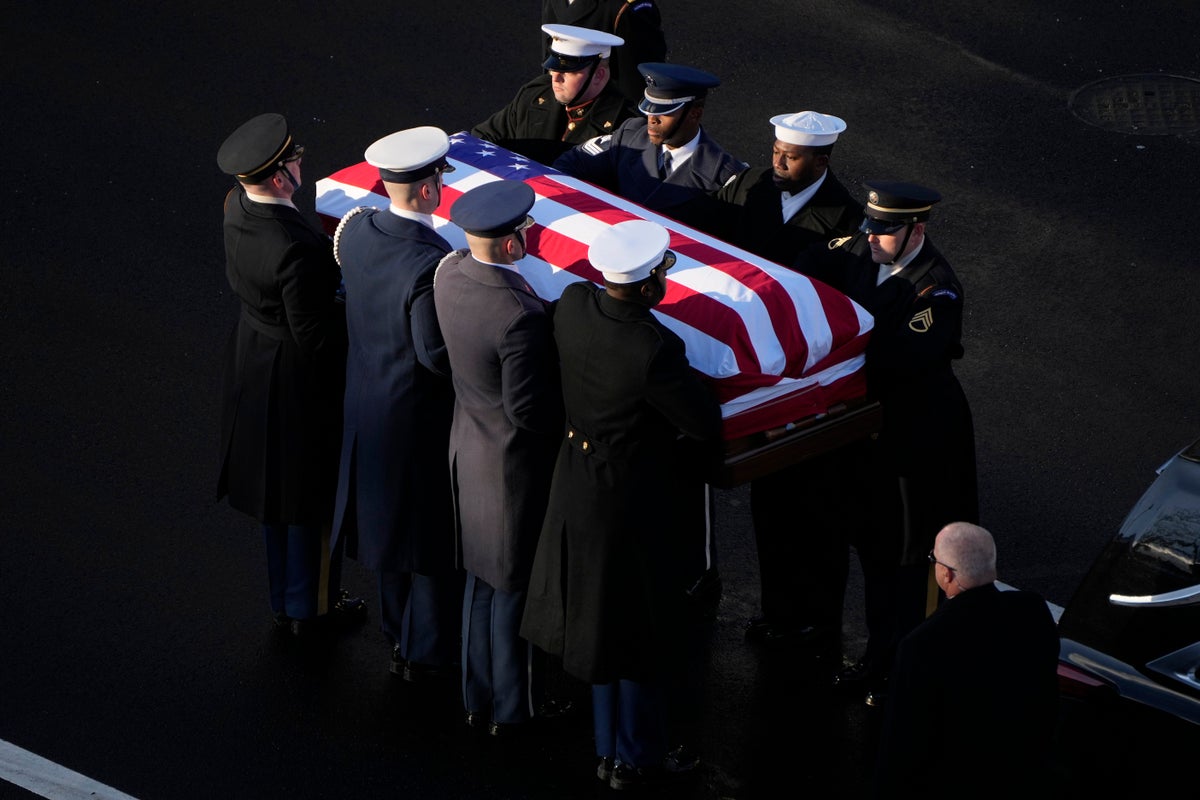
Nearly 44 years after Jimmy Carter left the nation's capital in humbling defeat, the 39th president returned to Washington for three days of state funeral rites starting Tuesday.
Carter’s remains, which had been lying in repose at the Carter Presidential Center since Saturday, left the Atlanta campus Tuesday morning, accompanied by his children and extended family. Special Air Mission 39 departed Dobbins Air Reserve Base north of Atlanta and arrived at Joint Base Andrews in Maryland. A motorcade carried the casket into Washington for a final journey to the Capitol, where members of Congress will pay their respects.
In Georgia, eight military pallbearers held Carter's casket as canons fired on the tarmac nearby. They carried it to a vehicle that lifted it to the passenger compartment of the aircraft, the iconic blue and white Boeing 747 variant that is known as Air Force One when the sitting president is on board. Carter never traveled as president on the jet, which first flew as Air Force One in 1990 with President George H.W. Bush.
The scene repeated outside Washington. The former president's casket was removed from the plane, canons fired and a military band played. A hearse emblazoned with the seal of the president joined a motorcade that steered toward Washington.
A bipartisan delegation of members of Congress were led in to the Capitol rotunda by Sens. Raphael Warnock and Jon Osoff, Democrats who represent Carter’s home state. Three of the nine U.S. Supreme Court justices also were present. Justices John Roberts, Brett Kavanaugh and Elena Kagan stood next to Washington D.C. Mayor Muriel Bowser in the rotunda.
The U.S. Army Band Brass Quintet played as people awaited the casket’s arrival.
Carter, who died Dec. 29 at the age of 100, will lie in state Tuesday night and again Wednesday. He receives a state funeral Thursday at Washington National Cathedral. President Joe Biden will deliver a eulogy.
There are the familiar rituals that follow a president’s death — the Air Force ride back to the Beltway, a military honor guard carrying a flag-draped casket up the Capitol steps, the Lincoln catafalque in the Rotunda.
There also will be symbolism unique to Carter. As he was carried from his presidential center, a military band played hymns — “Amazing Grace” and “Blessed Assurance” for the outspoken Baptist evangelical who called himself a “born-again Christian” when he sought and won the presidency in 1976. In Washington, his hearse stopped at the U.S. Navy Memorial, where his remains were transferred to a horse-drawn caisson for the rest of his trip to the Capitol. The location nods to Carter’s place as the lone U.S. Naval Academy graduate to become commander in chief.
All of the pomp carries some irony for the Democrat who went from his family peanut warehouse to the Governor’s Mansion and eventually the White House. Carter won the presidency as the smiling Southerner and technocratic engineer who promised to change the ways of Washington — and eschewed many of those unwritten rules when he got there.
From 1977 to 1981, Carter was Washington's highest-ranking resident. But he never mastered it.
“He could be prickly and a not very appealing personality” in a town that thrives on relationships, said biographer Jonathan Alter, describing a president who struggled with schmoozing lawmakers and reporters.
Carter often flouted the ceremonial trappings that have been on display in Georgia and will continue in Washington.
As president, he wanted to keep the Marine Band from playing “Hail to the Chief,” thinking it elevated the president too much. His advisers convinced him to accept it as part of the job. The song played Saturday as he arrived at his presidential center after a motorcade through his hometown of Plains and past his boyhood farm. It played again as his remains were carried out on their way to Washington.
He also never used his full name, James Earl Carter Jr., even taking the oath of office. His full name was printed on memorial cards given to all mourners who paid their respects in Atlanta.
He once addressed the nation from the White House residence wearing a cardigan, now on display at his museum and library. His remains now rest in a wooden casket being carried and guarded by military pallbearers in their impeccable dress uniforms.
As Carter's remains left Georgia, President-elect Donald Trump criticized the late former president during a news conference in Florida for ceding control of the Panama Canal to its home country.
Pressed on if criticism of Carter was appropriate during the solemn funeral rites, Trump responded, “I liked him as a man. I disagreed with his policies. He thought giving away the Panama Canal was a good thing.”
“I didn’t want to bring up the Panama Canal because of Jimmy Carter’s death,” he added, even though he had first mentioned it unprompted.
___
Cooper reported from Phoenix.







